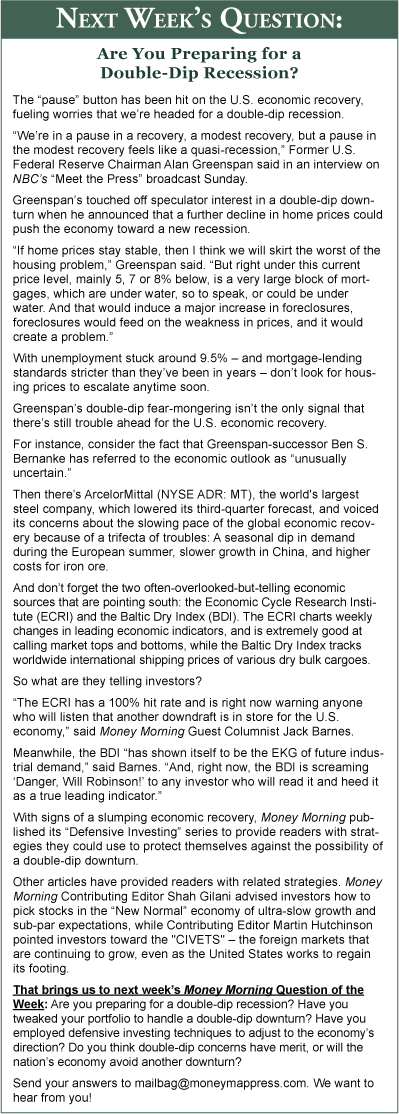The BP PLC (NYSE ADR: BP) oil spill disaster has shone a spotlight on oil industry pollution. While BP takes the brunt of public anger, no oil company has escaped the wrath of critics who are eager to expose an industry they feel shortcuts safety standards for profit.
Comments from readers with first-hand industry experience continue to pour into Money Morning's Mailbag, sharing their thoughts on the oil industry's operations.
MM Reader: Rep. George Miller, D-CA, cited BP's "flagrant history of taking risks to boost profits that has resulted in deaths of workers, destruction of the environment and economic chaos in local communities."
Hmm...does that also apply to a certain Occidental Petroleum, a U.S. company that operated in U.K. waters and killed some 167 people due to inept and negligent management?
Or how about Nigeria:
"On 1 May this year a ruptured Exxon Mobil Corp. (NYSE: XOM) pipeline in the state of Akwa Ibom spilled more than a million gallons into the delta over seven days before the leak was stopped. Local people demonstrated against the company but say they were attacked by security guards. Community leaders are now demanding $1 billion in compensation for the illness and loss of livelihood they suffered. Few expect they will succeed. In the meantime, thick balls of tar are being washed up along the coast."

Personally I have no love lost for BP, I think they (along with rest of the oil and chemical companies) operate as loose and fast as they can manage in the regulatory domains in which they operate. I know that first hand as I once worked for a chemical company (not a U.K. or U.S. one, and not BP!).
So is it purely BP? Sure - nail them to the mast if you want, but if you don't include every other polluter in the same boat, then this will be exposed as the hypocrisy and U.S. oil imperialism it increasingly appears to be.
Look to the Piper Alpha disaster - the U.K. gave indemnity to all U.S. citizens involved for total open testimony as to the causes, legislated heavily afterwards, cleared up the mess ourselves, and never turned it into a trans-Atlantic political spat like [U.S. President Barack] Obama has with this mess.
Oh, and it didn't cause 11 deaths, but 167...slight difference...
- Matt
While BP will remain in headlines for months to come, news from other countries and their oil spill activity is surfacing.
A July 16 oil pipeline explosion in China's port of Dalian caused 1,500 metric tons of oil to leak into the Bohai Sea - or so the government said.
Studies by Greenpeace determined that as much as 60,000 metric tons of crude oil could have spilled into China's coastal waters.
"It is habitual for governments and oil companies to understate the size of an oil spill, and to understate the environmental impact of an oil or chemical spill, and to overstate the impact of their response," Richard Steiner, an oil spill expert with the University of Alaska invited by Greenpeace to help conduct investigations in the area, told Reuters.
The United Kingdom claimed to have learned its oil-safety lesson with the 1978 Piper Alpha explosions in the North Sea off the coast of Scotland. The accident killed 167 men and led to tighter regulation of the oil industry. Occidental Petroleum Corp. (NYSE: OXY) ran the oil platforms.
However, Britain is looking to reduce its reliance on oil and gas imports by ramping up North Sea production, and has announced a parliament inquiry into drilling practices in the wake of the BP spill.
Oil companies estimate the North Sea could offer 1.5 million barrels of oil a day by 2020 if companies get the funds and tax breaks to continue drilling projects.
Companies that drill in the North Sea rely on subcontractors to save money, and pay bonuses to subcontractors with low accident and injury rates. But critics say those incentives just encourage subcontractors to hide and under-report safety issues.
"The real main issue is under-reporting of accidents and safety issues," said Professor Matthias Beck, co-author of a major Piper Alpha study. "Conditions in the North Sea are very rough, the natural hazards are much greater than in the Gulf of Mexico and the oil is also expensive, so in a sense it's one of the less profitable oil provinces."

According to oil industry trade union representative Jake Molloy, Britain has made safety improvements, but under-reporting is definitely a problem.
"A lad suffered a serious injury when a piece of equipment hit him in the face and had to go onshore for medical treatment," said Molloy. "The company then asked him if, on completion of the treatment, he would come into the office - the objective being to disguise the lost time from injury being recorded and ensure that the performance-related bonus was paid."
Of course, the biggest under-reporting epidemic isn't thought to be in the United States or Europe, but rather the oilfields of Africa.
The Niger delta is home to 606 oilfields and supplies 40% of U.S. crude imports. It boasts the best quality oil in the world, but has paid dearly for its resource.
According to two independent investigations, more oil spills into the Niger delta annually than has been lost in the Gulf of Mexico. Nigerian federal government figures show there were more than 7,000 oil spills in the Niger delta between 1970 and 2000.
After the May 1 Exxon Mobil oil spill mentioned by reader "Matt" above, community members expressed fears about the future of their homes and livelihood, as many are fishermen.
"The situation is now worse than it was 30 years ago," said local Ben Ikari. "When I see the efforts that are being made in the U.S., I feel a great sense of sadness at the double standards. What they do in the U.S. or in Europe is very different."
Over 1,000 spill cases have been filed against Royal Dutch Shell PLC (NYSE ADR: RDS.A, RDS.B), and the company blames vandalism, theft and sabotage for the causes.
"Sometimes communities do not give us access to clean up the pollution because they can make more money from compensation," a Shell spokesman told The Observer.
But local communities dispute the claims and say rusty pipes and crumbling pumping stations are the real problems. And critics claim the companies have kept the extent of problems under wraps.
"Estimates put spill volumes in the Niger delta among the worst on the planet, but they do not include the crude oil from waste water and gas flares," activist Ben Amunwa, from a London oil watch group, told The Observer. "Companies such as Shell continue to avoid independent monitoring and keep key data secret."
With oil companies' credibility increasingly in question, investors should start taking more of an interest in the safety plans and environmental concerns of those with whom they invest.
(**) Money Morning editors reserve the right to edit responses for grammar, length and clarity when posting on our Web site. Please include your name and hometown with your email.
News and Related Story Links:
- Money Morning News Archive:
BP Stories
- Money Morning News Archive:
Oil Spill Stories
- The Christian Science Monitor:
Eyeing BP oil spill, British question if North Sea oil firms also push bounds of safety
- Money Morning:
BP Hopes for a CEO Savior in American Robert Dudley
- Money Morning News Archive:
Money Morning Mailbag Feature


